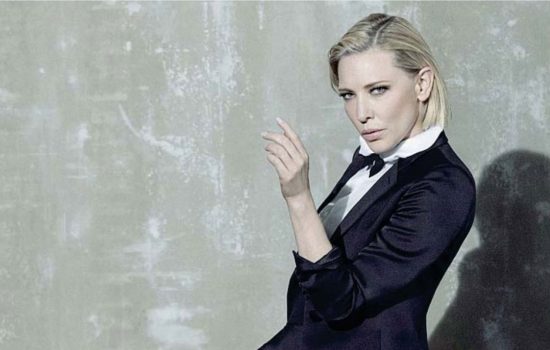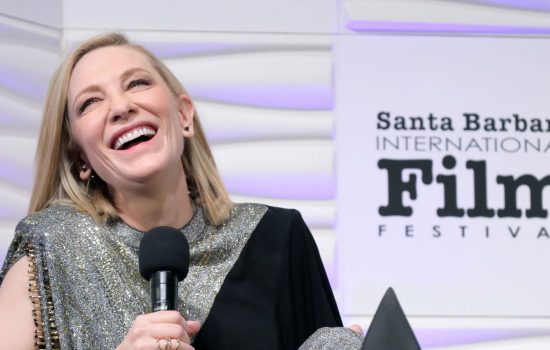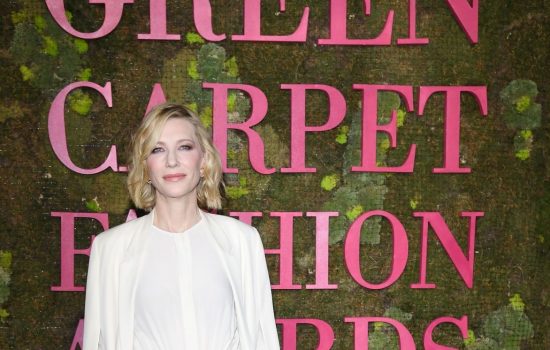Hi, Blanchetters! Cate will be receiving Lifetime Achievement Award from Terra di Sienna International Film Festival and there’s new interview ahead of Venice Film Festival to start on September 2nd.
Cate Blanchett will be the main guest of the great Gala Event at the Venice Film Festival, organized by the Terra di Siena International Film Festival together with Quinn Studios Entertainment and Bellagraph Nova Group
The press conference of the Terra Di Siena International Film Festival (29-9 / 4-10 2020) will be held in Venice during the 77th edition of the Venice Film Festival.
During the press conference scheduled for September 4, with the support of the HFPA Hollywood Foreign Press Association of Los Angeles, an official tribute will be held to Lorenzo Soria, President of the HFPA / Golden Globe Awards who passed away on August 7 in Los Angeles. Cate Blanchet, official member of the jury of the Venice Film Festival, will be present at the event and will also speak in honor of Lorenzo Soria.
As part of the press conference Terra di Siena International Film Festival will announce the program of the new edition to be held in the beautiful setting of Siena from (29 to 9 September to 4 October) and Cate Blanchett will be delivered to the prestigious SEGUSO Award for Lifetime Achievement , created by Murano glass masters who have always been alongside the great cinema.
The second SEGUSO AWARD will be awarded to the young international actor Diego Boneta, protagonist and producer of the film “NEW ORDER” in competition in Venice.Expected by the creator of the Festival Maria Pia Corbelli, by the artistic director Antonio Flamini and by the producer Valentina Castellan, producer of the documentary “Oleg” which will be previewed (www.olegvidovfilm.com):
Cate Blanchet, Oliver Stone, members of the HFPA, the President of the Biennale Roberto Cicutto, the Director of the Venice Film Festival Alberto Barbera, Martha De Laurentiis, the actor Diego Boneta protagonist of the film in competition “New Order”, the Composer Andrea Guerra, former winner of the 2017 Venice Biennale Lifetime Achievement Award, representing the Bellagraphil Marketing Chief group. Nereides de Bourbon.
Sponsor of the evening Bellagraph Nova Group, an important French financial group that brings together 31 international companies from different sectors under the same name. Bellagraph will be presented in Italy during the Venice Film Festival and will preview its debut in the world of entertainment led by the new Media & Communication Director Valentina Castellani Quinn and by Nereides De Bourbon Chief Marketing of the Group.
Venice Jury Head Cate Blanchett Applauds Festival Diversity: ‘Industry Can’t Continue Bad and Lazy Habits’
When the Venice Film Festival unveiled its official selection in late July, the unprecedented inclusion of eight female-directed titles within the 18-film roster was heralded as welcome progress for an event that has come under fire in recent years for scarce representation of female filmmakers.
Cate Blanchett was selected to head the jury in January, becoming the third woman in four years to hold the role, following Lucrecia Martel and Annette Bening. The “Mrs. America” star — who headed the 2018 Cannes Film Festival jury, leading a #MeToo protest on the red carpet with the likes of Ava DuVernay and Agnes Varda — is well aware of the watershed year she’s overseeing. “Maybe the main competition should be called ‘New Horizons’ this year,” she quips, referencing the popular festival sidebar.
“It falls upon us as an industry where, as we emerge into this brave new world, we’re not bringing bad and lazy habits with us, like ignoring diverse and interesting voices,” Blanchett says plainly, adding that 13 films in the Official Selection are from new directors who haven’t previously competed for a Golden Lion.
“Audiences just want to see films that inspire and ignite them and reflect their lives back to them in illuminating ways. And it’s wonderful that when they see the credits roll [at Venice] they can go, ‘Oh my God, over 40% of the directors are female.’”
Blanchett, who was speaking to Variety from her home in the U.K., where she’s remained since returning from February’s Berlinale, says the wave of female directors at Venice, which included just two female directors in the 21-title 2019 competition, is “a direct response to the positive advances that have been made this year: not to have lazy thinking and marginalize incredibly talented people, of whom often the majority are women.”
Venice artistic director Alberto Barbera says the inclusion of the eight female directors, among them Norwegian-American “The World to Come” director Mona Fastvold and “Nomadland” helmer Chloe Zhao, was a way to “show that we didn’t have, in the past, any prejudice against women — it’s just a matter of the quality of the films itself.”
The festival in 2018 took the 50/50 for 2020 gender parity pledge, albeit under the complex Biennale umbrella, and is “close to achieving its commitment,” but the executive offered no specifics beyond saying the festival is “absolutely committed” to the movement.
“This year, we were struck by the high quality of the films made by women, so it was a pleasure to invite them,” Barbera adds. There were, in fact, more films from women that Venice wanted to include, he claims, but they weren’t yet ready due to the pandemic.
“I hope it’s a good sign for the future of cinema and the film industry. It’s always been a little bit dominated by males and prejudice against women. I think it’s going to change,” he notes.
As for how the festival can continue these positive strides into 2021, when the film calendar may return to some semblance of normality by fall? “There’s been such an enormous change, and it’s really difficult to try to guess what will [happen] in the next two to three years,” says Barbera, though he admits the “role of the festival will become more and more important” in uniting the industry.
Blanchett reminds that she has “firsthand” experience of how Venice can be a “real gamechanger” for filmmakers and actors, having been part of the 1997 “Elizabeth” premiere. “It’s a really important temperature take — perhaps more than ever. It’s the first gathering, the first re-emergence, for a lot of people, and for all of us as an industry.
“There’s an extra layer of responsibility this year because the opportunities for filmmakers to screen their work in a public platform have been much more limited,” says Blanchett. “So, whatever the deliberations the jury will make will be more impactful. I don’t take that responsibility or privilege lightly.”
This year, around 90% of the festival will unspool in person, says Barbera. Some events will take place online, including panels, market activities and a few press conferences, but “all screenings will take place physically.”
“We’re going to ask juries to attend the official screening of the films with the audience, so they can have immediate feedback about the public reaction,” adds the director. Most theater capacities will also be reduced by 50% to accommodate social distancing. Meanwhile, red carpets will be rolled out, albeit without the crowds.
“But it’s fantastic that [Venice] has safely, albeit in a limited way, still folded in the general public into the screenings because that audience is why filmmakers make film in the first place,” declares Blanchett, who has hoped, since February, that she’d be able to travel to Italy for the fest.
“For me, personally, cinema is an event. While streaming in our living rooms has sustained us in many ways and fed us over the recent months, it’s not an event. And often, diverse and subtle voices really do need a festival context.”
Blanchett also can’t mask her enthusiasm for the prospect of a film festival unburdened by the pressure of awards season, as Venice generally is. “I think it’s wonderful,” she beams.
“When processes like the award season process or the festival process, or the way one creates work or develops a script, get calcified, it becomes a deeply uncreative environment. So if there’s any opportunity in the environment we’re in now, it’s to re-evaluate the way work has been made.”





 A Manual for Cleaning Women (202?)
A Manual for Cleaning Women (202?) Father Mother Brother Sister (2025)
Father Mother Brother Sister (2025)  Black Bag (2025)
Black Bag (2025)  The Seagull (2025)
The Seagull (2025) Bozo Over Roses (2025)
Bozo Over Roses (2025) Disclaimer (2024)
Disclaimer (2024)  Rumours (2024)
Rumours (2024)  Borderlands (2024)
Borderlands (2024)  The New Boy (2023)
The New Boy (2023) 











